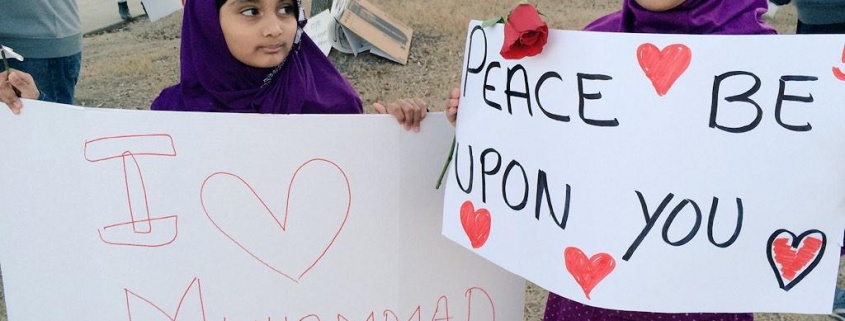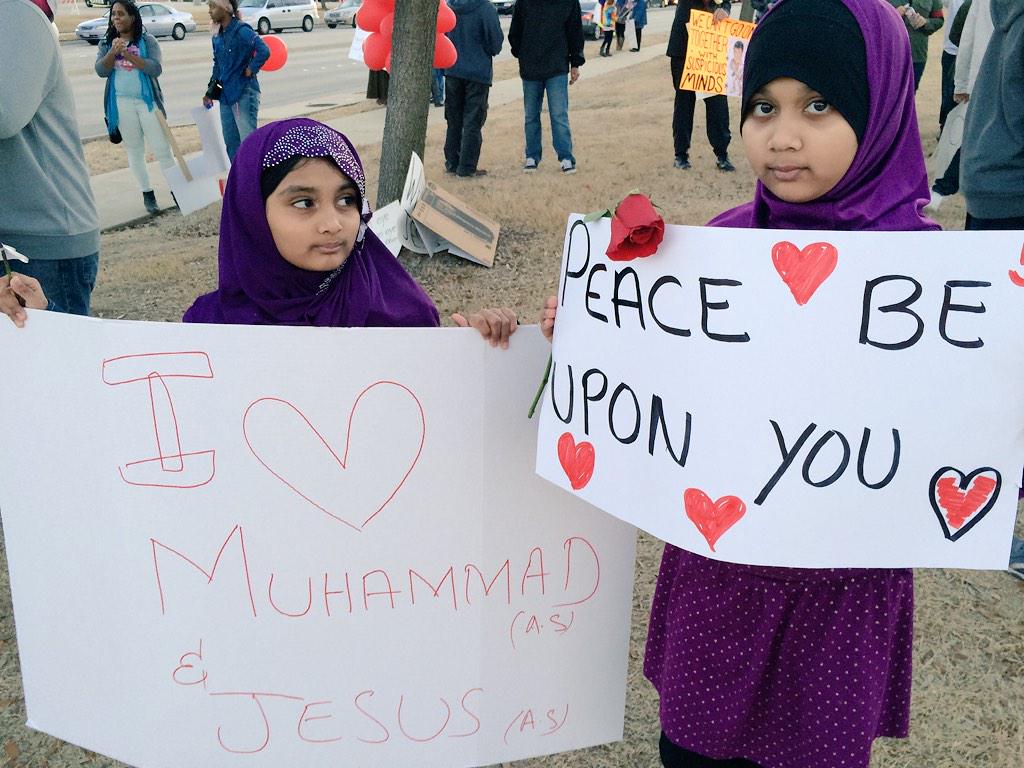Nine Ways to Respond to Islamophobia
Children peacefully protesting outside of anti-Islam rallies in Garland, TX (Jan. 18, 2015). Photo Credit: Robert McMurrey/Twitter
By Ashraf Traboulsi
All praise and thanks to Allah for his countless blessing upon us. We seek his help, his guidance and refuge in him from all evil around us including our own.
I would like to focus today on the regrettable events of the last few days and what we need to do and what kind of actionable steps we need to take.
First, it is imperative that we, as Muslims, reject and condemn these crimes.
Regardless of any grievances, Islam doesn’t give anybody a license to kill innocent people. We also need to acknowledge that such incidents have a tremendous impact upon us. The issue is twofold:
There are people and groups who are committing heinous acts in the name of Islam. These acts are leading to the regrettable loss of innocent life.
These acts, in addition to being counter to the teachings of Islam, are having an extremely negative impact on Islam and Muslims all over the world.
There are those who are taking advantage of these events to spread hatred and fear of Islam and Muslims to the point that the term “Islamic terrorism” is becoming an acceptable term to use in mainstream media outlets.
Islamophobia is becoming rampant and Islamophobes are having a field day.
What should we do?
1. We need to implement the teaching of Allah in the Quran and His counsel to Prophet Muhammad (pbuh) when he was subjected to prosecution, abuse, mockery: “So be patient over what they say and exalt [Allah] with praise of your Lord before the rising of the sun and before its setting; and during periods of the night [exalt Him] and at the ends of the day, that you may be satisfied” (Quran 20:130). We need to exercise patience and strengthen our spiritual connection with Allah, seeking wisdom, guidance and help from Him in these difficult situations.
2. We shouldn’t despair despite the difficult time: “for indeed with hardship there will be ease, with hardship there will be ease” (Quran 94: 4-5). We should never lose hope that the days coming will be better: “despair not of relief from Allah. Indeed, no one despairs of relief from Allah except those disbelieving in Him.”
3. We need to learn our Islam and be ambassadors for our faith. We shouldn’t allow extremists or Islamophobes to define our Islam. We should define Islam by our own actions and conduct. If we love the Prophet (s) and want to defend him from mockery and abuse we should follow his footsteps, his moral conduct and his teaching: “There has certainly been for you in the Messenger of Allah an excellent role model for anyone whose hope is in Allah (God) and the Last Day and [who] remembers Allah (God) often” (Quran 33:21). In short we should be proud Muslims and act out our faith with high moral character.
4. We need to be vigilant, aware of our surroundings, and concerned about our safety and the safety of our institutions. Every time there has been such an event, it was followed by a spike in hate crimes against Islam and Muslims. Masjids around the country are receiving hateful and threatening phone calls; some have already been subject to attacks.
5. We should be vigilant and protective of our children from those who might target them through incitements, social media and other means. Extremist groups are targeting marginalized Muslims, mainly the youth. They are exploiting feelings of injustice to recruit people to serve their agenda. There are some law enforcement agencies, utilizing shady informants with criminal pasts, to incite and trap Muslims and monitor Islamic centers and Muslim groups.
6. We should always seek help, guidance and counseling. For the young, if you have any issue, if you are being bullied in school, if you are being called names, please talk your parents, a trusted family member; tell your teacher and your principal. If anyone feels threatened, one should immediately contact the authorities.
7. We should be educated about the issues and educate those around us. The fear of the unknown is real and people around us know very little about Islam except what they hear in the media. We have a tremendous responsibility to reach out and connect with the larger community. This is the main goal of the outreach program at the Islamic Center of Greater Cincinnati.
8. We need to spread awareness that Muslims have suffered the largest number of victims of such crimes. We need to open the eyes of the world to the double standards that we are subjected to. Nobody cared or heard about ISIS until they committed the heinous crime of murdering three Western journalists. Hundreds of Syrians died at the hands of ISIS before without any response, as if their lives have a lesser value?
9. The world response to such incidents needs to go beyond security solutions and military actions to taking serious actions to address issues of social injustice and human rights. There are millions of refugees from Syria, Palestine, Iraq, Afghanistan and many African nations. The majority of them are children with deep psychological trauma. These will grow up to be prime targets of twisted agendas and extreme ideology. They are just asking for the one basic human right: the right to live. The world is spending billions and trillions on military adventures while it is short of resources to provide food, shelter and safety for these millions.
May Allah help all those who are suffering, those who are near and those who are far.
In ending I pray to Allah to guide us to stand up for the truth, defend all the innocent victims, grant his love and the love of those whom He loves and love of all things that he loves.
Editor’s Note: This is the congregational prayer khutba (sermon) prepared and delivered Friday, Jan. 16 by Dr. Ashraf Traboulsi at the Islamic Center of Greater Cincinnati in West Chester, where he is a volunteer Imam and board member. The khutba was originally printed in The Cincinnati Enquirer and is reprinted here with permission. All views expressed here are solely those of the author.


















2015
2,460 views
views
0
comments